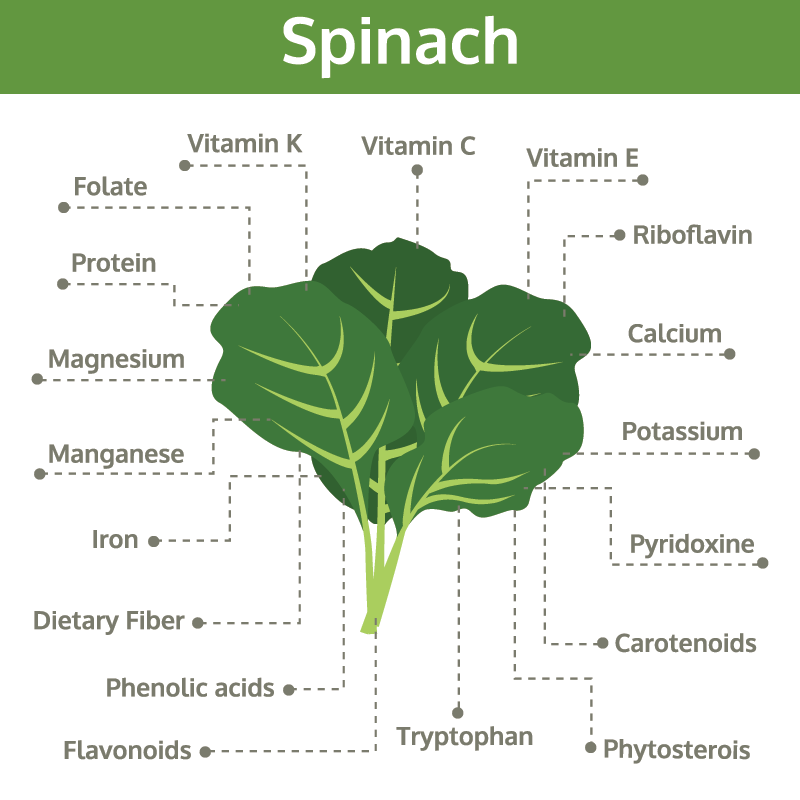Your trusted source for simple, practical nutrition advice and tips for a healthier lifestyle.
Spinach is rich in vitamins A, C, and K. It is also a great source of iron, calcium, and antioxidants. Spinach stands out as a powerhouse of essential nutrients that benefit overall health.
Packed with vitamins A, C, and K, it supports immune function, skin health, and bone strength. The leafy green is also an excellent source of iron, which is crucial for blood health. Calcium in spinach promotes strong bones and teeth.
Its antioxidants protect the body from free radicals, reducing the risk of chronic diseases. Low in calories but high in fiber, spinach aids digestion and weight management. Incorporating spinach into your diet can lead to significant health improvements, making it a valuable addition to your meals.
Introduction To Spinach
Spinach is a leafy green vegetable that packs a nutritional punch. It’s loaded with vitamins, minerals, and antioxidants. This versatile veggie is used in a variety of dishes worldwide.
Historical Background
Spinach originated in ancient Persia, now modern-day Iran. It was introduced to China in the 7th century and later to Europe in the 12th century. By the 16th century, spinach had become a staple in European diets.
Cultural Significance
Spinach holds cultural importance in many regions. In the Middle Ages, it was called the “Spanish vegetable” in England. Spinach is a key ingredient in several Mediterranean dishes. In the United States, it gained fame through the cartoon character Popeye.
| Key Nutrients | Benefits |
|---|---|
| Vitamin A | Supports vision and immune function |
| Vitamin C | Boosts skin health and immunity |
| Iron | Helps in blood formation |
| Calcium | Strengthens bones |
- Spinach is low in calories.
- It is high in fiber.
- Rich in antioxidants, it fights free radicals.
- Add spinach to your smoothies.
- Use it in salads for a nutrient boost.
- Cook it as a side dish for dinner.
Nutrient-rich Profile
Spinach is a superfood packed with essential nutrients. It’s loaded with vitamins, minerals, and antioxidants. This leafy green can boost your health in many ways.
Vitamins And Minerals
Spinach is a powerhouse of vitamins and minerals. Here are some key nutrients found in spinach:
- Vitamin A: Supports eye health and immune function.
- Vitamin C: Boosts the immune system and skin health.
- Vitamin K: Essential for blood clotting and bone health.
- Iron: Helps in the formation of red blood cells.
- Calcium: Vital for strong bones and teeth.
- Magnesium: Supports muscle and nerve function.
- Folate: Important for cell growth and metabolism.
Antioxidant Properties
Spinach contains a variety of antioxidants. These help protect the body from damage caused by free radicals. Some important antioxidants in spinach include:
- Beta-carotene: Supports vision and immune health.
- Lutein: Promotes eye health and may reduce the risk of chronic diseases.
- Zeaxanthin: Protects the eyes from harmful light waves.
- Quercetin: Has anti-inflammatory and antiviral properties.
Incorporating spinach into your diet is simple. You can add it to smoothies, salads, and many cooked dishes. Enjoy the myriad of nutritional benefits this leafy green has to offer!
Health Benefits
Spinach is a superfood packed with essential nutrients. These nutrients provide many health benefits. Consuming spinach can support your overall well-being.
Boosting Immunity
Spinach is rich in vitamins A and C. These vitamins strengthen your immune system. Vitamin A helps in the production of white blood cells. White blood cells fight infections and diseases.
Vitamin C also plays a crucial role. It helps in repairing body tissues. It also enhances the absorption of iron. This keeps your body strong and healthy.
Improving Digestion
Spinach is high in dietary fiber. Fiber aids in digestion. It helps food move smoothly through your digestive tract. This prevents constipation and promotes regular bowel movements.
Spinach contains natural compounds called oxalates. These compounds support a healthy gut. They promote the growth of good bacteria in your intestines.
| Nutrient | Benefit |
|---|---|
| Vitamin A | Boosts immunity by producing white blood cells |
| Vitamin C | Repairs body tissues and enhances iron absorption |
| Dietary Fiber | Improves digestion and prevents constipation |
| Oxalates | Supports a healthy gut by promoting good bacteria |

Credit: www.pinterest.com
Spinach For Heart Health
Spinach is a powerhouse of nutrients that benefit heart health. It is packed with vitamins, minerals, and antioxidants. These nutrients help keep your heart strong and healthy. Let’s explore how spinach can aid in lowering blood pressure and reducing cholesterol.
Lowering Blood Pressure
Spinach is rich in potassium, which helps maintain blood pressure levels. Potassium helps balance sodium in your body. This balance is vital for healthy blood pressure.
Here are some nutrients in spinach that help lower blood pressure:
- Potassium: Helps reduce the effects of sodium.
- Magnesium: Relaxes blood vessels.
- Nitrates: Improve blood flow.
Including spinach in your diet can help manage blood pressure. Add it to salads, smoothies, or cooked dishes.
Reducing Cholesterol
Spinach contains compounds that help reduce cholesterol levels. These compounds include fiber and antioxidants. Fiber helps remove bad cholesterol from your body.
Here are the key components that aid in reducing cholesterol:
- Fiber: Helps block cholesterol absorption.
- Antioxidants: Prevent cholesterol oxidation.
- Plant Sterols: Block cholesterol absorption in the gut.
Eat spinach regularly to support your heart health. It can be a delicious addition to any meal.
| Component | Benefit |
|---|---|
| Potassium | Maintains blood pressure |
| Magnesium | Relaxes blood vessels |
| Fiber | Reduces cholesterol |
| Antioxidants | Prevent oxidation |
Enjoy the benefits of spinach for a healthy heart. It is easy to add to your diet and delicious too!
Weight Management
Spinach is an excellent food for weight management. It is packed with nutrients and low in calories. This leafy green can help you stay full and control hunger. Let’s dive into how spinach can aid in weight management.
Low-calorie Food
Spinach is a low-calorie food. One cup of raw spinach contains just 7 calories. This makes it an ideal choice for those aiming to lose weight. You can add it to salads, smoothies, or soups without worrying about extra calories.
| Food | Calories per Cup |
|---|---|
| Raw Spinach | 7 |
| Cooked Spinach | 41 |
Satiety And Hunger Control
Spinach is rich in fiber. Fiber helps in keeping you full for longer periods. This helps in reducing overall food intake. A diet high in fiber can help control hunger and cravings.
- Spinach contains 2.2 grams of fiber per 100 grams.
- Fiber slows digestion, making you feel full longer.
- This helps in reducing the frequency of snacking.
Including spinach in your diet can be a simple and effective way to manage weight. Its low-calorie content and high fiber make it a great addition to any meal.

Credit: uniquehealthandwellness.com.au
Bone Health Support
Spinach is more than just a leafy green; it’s a powerhouse for bone health. This nutrient-packed vegetable offers essential nutrients that support strong bones. Let’s dive into two key components that make spinach a top choice for bone health.
Calcium Content
Spinach is rich in calcium, a vital mineral for bones. Calcium helps bones stay strong and reduces the risk of fractures. Eating spinach regularly can help you meet your daily calcium needs.
| Food | Calcium (mg per 100g) |
|---|---|
| Spinach | 99 |
| Milk | 125 |
| Cheese | 721 |
Vitamin K Importance
Spinach is also high in Vitamin K. This vitamin plays a key role in bone health. It helps in the formation of proteins needed for bone structure. One cup of spinach provides over 500% of the daily recommended intake of Vitamin K.
- Vitamin K helps in bone mineralization.
- It prevents the breakdown of bone tissue.
Including spinach in your diet can help maintain strong bones. It’s easy to add to salads, smoothies, and cooked dishes.
Incorporating Spinach In Diet
Incorporating spinach into your diet is a great way to boost your health. Spinach is rich in vitamins, minerals, and antioxidants. It’s versatile and can be used in various dishes. This section explores some easy ways to add spinach to your meals.
Smoothies And Juices
Adding spinach to smoothies and juices is simple and effective. Spinach blends well without altering the flavor much. Here are some ideas:
- Green Smoothie: Combine spinach, banana, and almond milk.
- Detox Juice: Mix spinach, apple, and ginger.
- Protein Smoothie: Blend spinach, Greek yogurt, and protein powder.
These drinks are perfect for breakfast or a quick snack. They are packed with nutrients and taste delicious.
Salads And Soups
Spinach adds a nutritional punch to salads and soups. It pairs well with a variety of ingredients. Here are some ways to include it:
- Spinach Salad: Toss spinach with cherry tomatoes, feta, and vinaigrette.
- Warm Spinach Soup: Simmer spinach with vegetable broth and onions.
- Chicken Spinach Salad: Mix spinach with grilled chicken and avocado.
These dishes are both healthy and satisfying. Spinach enhances flavor and nutrition.
| Dish | Main Ingredients | Benefits |
|---|---|---|
| Green Smoothie | Spinach, Banana, Almond Milk | Rich in vitamins and easy to make |
| Spinach Salad | Spinach, Cherry Tomatoes, Feta | High in antioxidants and fiber |
| Warm Spinach Soup | Spinach, Vegetable Broth, Onions | Comforting and nutrient-dense |
Spinach Myths And Facts
Spinach is a popular leafy green known for its health benefits. But many myths surround its nutritional value. This section will separate myths from facts.
Common Misconceptions
Many believe spinach is the ultimate superfood. Some myths include:
- Spinach has more iron than other greens.
- It can give you super strength like Popeye.
- Spinach is the best source of vitamins.
Evidence-based Insights
Research shows these facts about spinach:
| Myth | Fact |
|---|---|
| Spinach has the most iron. | Spinach contains iron, but not the most among greens. |
| Spinach gives super strength. | Spinach is healthy, but it won’t make you a superhero. |
| Spinach is the best vitamin source. | Spinach is rich in vitamins, but other foods also offer many nutrients. |
Spinach is nutritious but not magical. It offers many benefits:
- Rich in vitamin K for bone health.
- Contains vitamin A for eye health.
- High in antioxidants to fight free radicals.
_1685019998.jpg)
Credit: toneop.com
Frequently Asked Questions
What Are The Main Nutrients In Spinach?
Spinach is rich in vitamins A, C, and K. It also contains iron, calcium, and magnesium. These nutrients support overall health and wellbeing.
How Does Spinach Benefit Your Health?
Spinach supports immune function, bone health, and eye health. It also has anti-inflammatory properties and aids digestion. Regular consumption can improve overall health.
Is Spinach Good For Weight Loss?
Yes, spinach is low in calories and high in fiber. It helps you feel full longer and supports weight management. Adding spinach to your diet can aid in weight loss.
Can Spinach Improve Skin Health?
Yes, spinach’s high vitamin A content promotes healthy skin. It helps repair skin tissues and maintains skin moisture. Spinach also contains antioxidants that protect skin cells.
Conclusion
Spinach is a nutritional powerhouse packed with essential vitamins and minerals. Including spinach in your diet promotes overall health and wellness. Its rich content of antioxidants supports a strong immune system. Add spinach to your meals for a delicious and nutritious boost.
Enjoy the numerous health benefits this leafy green offers.





